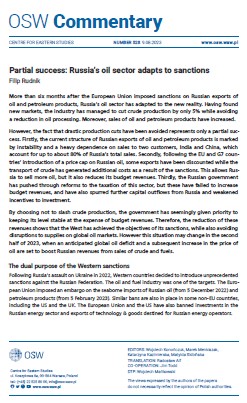Partial success: Russia’s oil sector adapts to sanctions
Partial success: Russia’s oil sector adapts to sanctions
Author(s): Filip Rudnik
Subject(s): Energy and Environmental Studies, Economic policy, Environmental and Energy policy, Government/Political systems, International relations/trade, Political behavior, EU-Approach / EU-Accession / EU-Development, Financial Markets, Russian Aggression against Ukraine
Published by: OSW Ośrodek Studiów Wschodnich im. Marka Karpia
Keywords: Russia; Oil sector; Western sanctions; Oil production; Russian exports of oil and petroleum;
Summary/Abstract: More than six months after the European Union imposed sanctions on Russian exports of oil and petroleum products, Russia’s oil sector has adapted to the new reality. Having found new markets, the industry has managed to cut crude production by only 5% while avoiding a reduction in oil processing. Moreover, sales of oil and petroleum products have increased. However, the fact that drastic production cuts have been avoided represents only a partial success. Firstly, the current structure of Russian exports of oil and petroleum products is marked by instability and a heavy dependence on sales to two customers, India and China, which account for up to about 80% of Russia’s total sales. Secondly, following the EU and G7 countries’ introduction of a price cap on Russian oil, some exports have been discounted while the transport of crude has generated additional costs as a result of the sanctions. This allows Russia to sell more oil, but it also reduces its budget revenues. Thirdly, the Russian government has pushed through reforms to the taxation of this sector, but these have failed to increase budget revenues, and have also spurred further capital outflows from Russia and weakened incentives to investment. By choosing not to slash crude production, the government has seemingly given priority to keeping its level stable at the expense of budget revenues. Therefore, the reduction of these revenues shows that the West has achieved the objectives of its sanctions, while also avoiding disruptions to supplies on global oil markets. However this situation may change in the second half of 2023, when an anticipated global oil deficit and a subsequent increase in the price of oil are set to boost Russian revenues from sales of crude and fuels.
Series: OSW Commentary
- Page Count: 528
- Publication Year: 2023
- Language: English
- Content File-PDF

